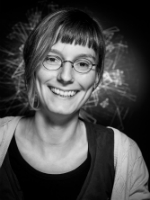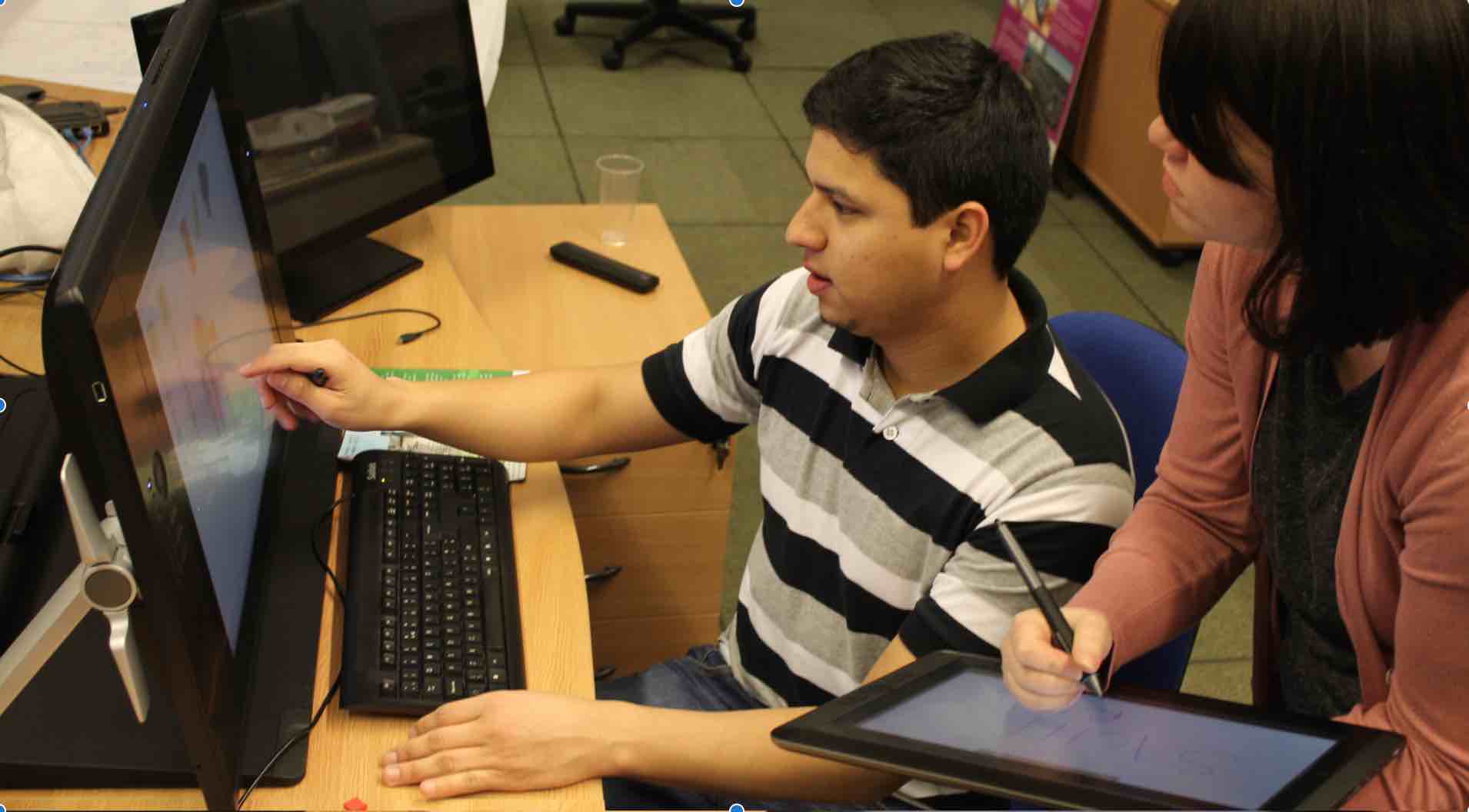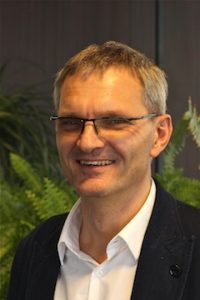News
SACHI and the School of Computer Science in the University of St Andrews are delighted to welcome Dr Uta Hinrichs as a new lecturer. Uta has been a postdoctoral research fellow with SACHI since 2012 and she now co-leads SACHI along with her colleagues. During her time as a post-doc, Uta served on the program committee for CHI 2015 and she was the ACM ITS 2013 and ACM UIST 2013 volunteer co-chair. MORE
New Lectureship | RSE/Makdougall Brisbane Medal | AHRC funding for Palimpsest Project
General Chair MobileHCI’14 | Program Chair ITS’14 | Program Chair PerDis’14 | New SICSA theme
Best paper and honorable mention at CHI 2014 | Best paper at AVI 2014 | Best paper at DIS 2014
JISC funded Trading Consequences Launch | 9 papers and other works at CHI 2014.
Our newsfeed has details of these all these activities and research.
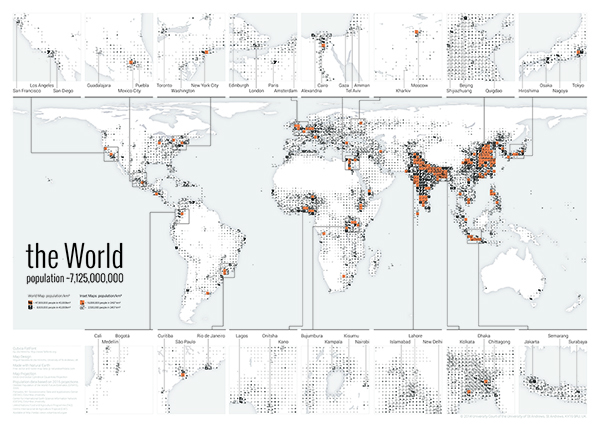
Looking for a gift for a visualization aficionado? We are happy to announce that the first ever FatFonts World Population Map is now available in the Axis Maps store. All proceeds from the maps will be used to fund more FatFont-related research.
The map shows how the population of the world is distributed. It uses a typographic visualization technique–FatFonts–which allows you to read the exact number of people living in a particular area with a precision within 100,000 people. Each number in the world map corresponds to the population in an area of approx. 40,000 km².
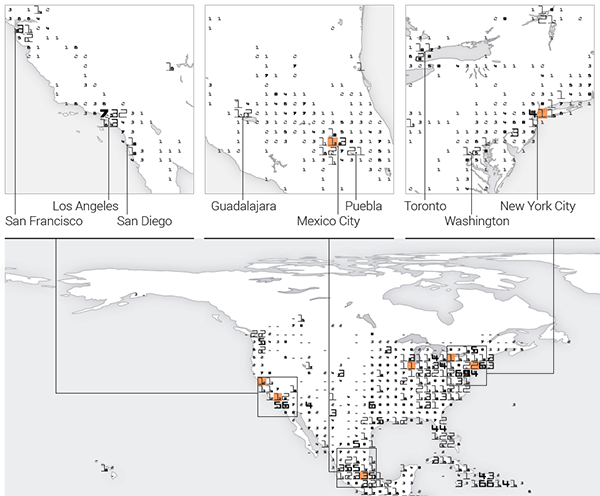
FatFonts – first conceived and designed by Miguel Nacenta and Uta Hinrichs – are digits that can be read as numbers, but also encode the information visually in the amount of ink that each digit uses. For example, digit eight 8 has eight times the amount of ink of digit one 1, digit seven 7 seven times and so on and so forth. This technique turns a table of numbers into a graphical representation where darker areas (with thicker numbers) represent higher population density. Stepping away from the map gives you an overview of which areas are heavily populated, coming closer lets you read the exact values.
To represent population densities from the tens of millions in a square (e.g., in New York City or Istanbul) to the hundreds of thousands, we use two layers: the FatFont numbers with orange backgrounds represent tens of millions of people. For example, the square that contains Buenos Aires shows you that fourteen million people live in that square of the world (the smaller 4 within the larger 1 represents the smaller order of magnitude). Tiles without an orange background represent populations between 9.9 million people to 100,000 (one order of magnitude lower).
This is an effective way to represent several orders of magnitude. The effect is quite mesmerising, and it gives you a good idea of where people actually live. Although it is possible to represent the same data with colours (i.e., colour scales), it is something different to see also the number itself. With the number you can easily make comparisons, calculate proportions, and relate what you see with the knowledge that you have already.
After a few minutes of looking at the map it starts to really sink in how empty some areas of the planet really are (Australia!), and how the real population centroid of the world is clearly in South East Asia. The map uses an equal-area projection; the numbers that you read are, therefore, also population densities. The representation is derived from the 2005 estimations for 2015 of the GPWFE dataset made available by SEDAC, Columbia University. 15 insets highlight interesting areas of high and low population in more detail, such as Northern China, Mexico City, Egypt, Western Japan, Bangladesh and Africa’s Great Lakes region.
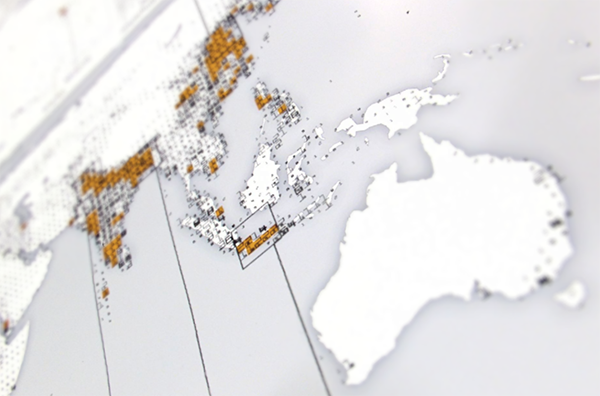
As part of a joint initiative to better understand pen+touch interaction in multi-touch devices, the SACHI lab has started a collaborative research endeavour with Wacom Co., Ltd. As a result, we recently welcomed some new arrivals to our lab: a Cintiq 24HD touch display and a Cintiq Companion Hybrid tablet.
This equipment has an ergonomic design with a high resolution screen which combines multi-touch and pen capabilities. We intend to use them to explore new interaction possibilities and provide insights that can be incorporated in the design process of new multi-touch devices. Specifically, we will study user interaction within the creative space of Complex Graphic Manipulations, and with children in the context of handwriting.
SACHI looks forward to keeping you up to date with our discoveries.

– photo by Callum Hyland
We are happy to announce that Dr Miguel Nacenta was appointed as co-leader of the SICSA Human-Computer Interaction research theme.
In his new position as SICSA HCI theme co-leader Miguel will, together with Professor Stephen Brewster of the University of Glasgow, take responsibility for the academic coordination of the theme and organize events such as the pre-CHI day, the All Hands Meeting and the SICSA HCI Doctoral Consortium.
If you are interested in the theme and its related events you can have a look at the SICSA HCI website, join the theme mailing list, or contact Miguel or Stephen for further information.
In late September 2014 a number of members from SACHI were involved with MobileHCI 2014 in Toronto Canada. Aaron Quigley was the general co-chair for this conference and Daniel Rough was the registration chair. Per Ola Kristensson, an external member of SACHI, presented a paper and was a session chair during the conference. MobileHCI brings together people from diverse areas which provides a multidisciplinary forum for academics, hardware and software developers, designers and practitioners to discuss the challenges and potential solutions for effective interaction with and through mobile devices, applications, and services.
 This year MobileHCI was able to have a single track for the entire program which allowed everyone to see all the papers, posters, demos, design contest, panels etc. without trying to change sessions. Some images from this conference can be found here. Aaron is now the chair of the MobileHCI conference series steering committee until August 2015.
This year MobileHCI was able to have a single track for the entire program which allowed everyone to see all the papers, posters, demos, design contest, panels etc. without trying to change sessions. Some images from this conference can be found here. Aaron is now the chair of the MobileHCI conference series steering committee until August 2015.In early October a number of SACHI members were again involved with or attended UIST 2014, the ACM Symposium on User Interface Software and Technology. We organised this conference, UIST 2013 here in St Andrews last year. In 2014, Per Ola Kristensson was the demo co-chair and Jakub Dostal was the registration co-chair. Per Ola was also awarded a lasting impact award during UIST 2014. Aaron Quigley will be the keynote chair for UIST 2015 in Charlotte, NC Nov 8-11, 2015.
 The ACM Symposium on User Interface Software and Technology (UIST) is the premier forum for innovations in human-computer interfaces. UIST brings together people from diverse areas including graphical & web user interfaces, tangible & ubiquitous computing, virtual & augmented reality, multimedia, new input & output devices, and CSCW.
The ACM Symposium on User Interface Software and Technology (UIST) is the premier forum for innovations in human-computer interfaces. UIST brings together people from diverse areas including graphical & web user interfaces, tangible & ubiquitous computing, virtual & augmented reality, multimedia, new input & output devices, and CSCW.You can read Aaron’s full blog post about the papers he noted to SACHI here.

Dr Per Ola Kristensson, one of the cofounders of SACHI, has become a University Lecturer in the Department of Engineering at the University of Cambridge. In his time at St Andrews he helped to establish the teaching and research footprint for HCI across the School of Computer Science. Speaking to SACHI Per Ola said, “I have enjoyed my time in St Andrews tremendously. It is an incredibly stimulating and vivid research environment and the growth and international visibility of the St Andrews Human Computer Interaction (SACHI) group is a testament to this.” The students here will miss him as will his colleagues. Working with students is clearly close to Per Ola’s heart, as he noted that “both the undergraduate students and the MSc students I have been teaching have been fantastic. It is incredibly rewarding to teach HCI to motivated students.”
Per Ola helped establish SACHI in many ways, from bringing leading researchers to our seminar program to new funded research projects. Professor Aaron Quigley said, “We will all miss Per Ola very much. His energy and razor sharp intellect helped in our research, teaching and in developing new insights into challenging problems”. Per Ola went on to say that, “the collegial atmosphere is superb and the intellectual environment in the SACHI group has resulted in many papers at CHI, AVI, IUI, etc. co-authored together with colleagues, PhD students or undergraduate students. Some of these papers have also been featured in the international press or won best paper prizes.”
During his time with St Andrews, Per Ola had many successes from being awarded the RSE/Makdougall Brisbane Medal to being the only UK member of the TR35, the most prestigious annual list published by MIT TechnologyReview in 2013. Speaking of Per Ola as an academic Aaron said , “While Per-Ola has some serious business credentials under his belt, he is a true academic scholar, in every meaning of that term. He values academia deeply and understands that high quality research with impact doesn’t come overnight. Instead, it comes with deep thought, studious application of suitable methodology and care in reporting research results”.
Speaking about the School of Computer Science and the University Per Ola said, “people here have a genuine belief in academic values and the importance of ensuring teaching and research is of the highest calibre.” Dr Miguel Nacenta, another of Per Ola’s colleagues added, “Per Ola has been a great colleague and a friend. Working with him has enriched all of us at SACHI and we hope that the strong ties that we keep with him result in many more fruitful collaborations.”
Dr Per Ola Kristensson is now a Honorary Reader in the School of Computer Science and continues to be a member of SACHI. Looking back on his time in St Andrews Per Ola noted, “these years I have spent in St Andrews have helped me develop as a researcher and a teacher and I will remember my years here fondly”. We all wish Per Ola well on the next step in his career, it has been our great pleasure to work together for these past few years.
We are delighted to welcome Jonathan Hughes as an honorary research fellow to SACHI and the School of Computer Science. Jonathan is Founder & CEO of Butterfly Catcher and was formerly a founder employee of Realtime Worlds Inc., helping to create the BAFTA-winning videogame franchise ‘Crackdown’ for Microsoft Game Studios. As Principal Designer there he was also responsible for the design direction of ‘MyWorld’, a hugely ambitious entertainment platform which secured $50m funding from NEA and WPP, with executive design oversight of the UK and Asia-Pacific projects. After running the software development agency Zedaxis for several years, with clients such as Skyscanner and the NHS, he founded Butterfly Catcher in 2012, focusing on data visualisation for industry, and in particular finance.
Commenting on his honorary fellowship Jonathan said “I’m delighted to be appointed to this role. Aaron’s team at SACHI have a tremendous reputation and they are undertaking world-leading research which is highly applicable to industry. Being given the opportunity to be involved is very exciting indeed.”
Jonathan has a Masters (Dual Hons) in Psychology & Philosophy from the University of St Andrews, where he specialised in visual perception so this is a return home of sorts! Professor Aaron Quigley said of this fellowship, “we are delighted to have Jonathan join us and we are looking forward to many fruitful collaborations. With his 15 years of industrial experience across a wide range of industry sectors, Jonathan brings a new dynamic to SACHI which we are looking forward to.” Jonathan will contribute to St Andrews HCI research (SACHI) with respect to seminars, involvement in informal supervision, exploration of joint research projects, advice on information visualisation and the finance sector along with working with staff and students on research projects. We also expect Jonathan to provide advice on Palimpsest along with developing new projects and ideas with collaborators within SACHI (both within St Andrews and across Scotland).
We’re delighted to announce the launch of the new SICSA knowledge exchange theme: Medical Imaging and Sensing in Computing. Led by Dr David Harris-Birtill from the University of St Andrews’ SACHI group, David has been awarded full funding for a series of events to foster new development and collaboration on this topic. (see full SICSA news item)
The theme will run until 31st July 2015 and will have events open to all universities in Scotland, stimulating new ideas, connections and collaborations in this exciting and dynamic field. Dr Robert Davey from Toshiba Medical Visualization Systems is the industry expert who will also be working with us on this theme, providing useful input on the commercial application of this area.
What does the new SICSA knowledge exchange theme cover?
Computing has provided significant technological advancements within medicine over the last decade, contributing to medical imaging within MRI and X-ray CT, PET and ultrasound and optical imaging, and in recent years, advances in smart phones and wearable sensors have also enabled patients and clinicians to get complementary information. These imaging and sensing advances impact the general population as they have found methods to detect cancer, detect arterial plaque which leads to heart attacks, and guide cancer radiotherapy treatments by providing information on how much radiation dose to give to which parts of the body.
By starting this new SICSA theme, Medical Imaging and Sensing in Computing, like-minded researchers across Scotland can form a new intellectual community, promote their research, and foster creativity across institutions and collaborations between academia and industry. In addition, computer scientists involved in other research fields, such as machine learning, will be invited to connect their relevant work to the field of medicine, sparking innovative new projects. Toshiba Medical has highlighted that local industry needs to connect with talented young academics to help stimulate new ideas, engage with academia to find joint funding for industry focused research, and attract talented personnel for recruitment in such a rapidly-growing field.
New areas of research and development needed within industry include extracting useful medical information from wearable sensors, and getting information from large data sources, such as vast medical image and data stores, to help detect disease earlier and make chronic illnesses more treatable. Ultimately this theme enables researchers from across Scotland at all stages of their careers to make meaningful connections with other academics and industry members, to work together to improve patients’ lives. We look forward to the first event!
Professor Harald Reiterer will visit SACHI in St Andrews from October of 2014 until March of 2015 on his research sabbatical. Together we have established ideas for new interaction paradigms for Distributed User Interfaces, like Blended Interaction. Harald visited SACHI in March 2013 and gave an invited talk about this topic. To discuss and present our ideas a greater audience we have organized together with a CHI 2013 workshop around this topic (More information are available here: http://hci.uni-konstanz.de/blendedinteraction2013/). As a follow up activity of the CHI 2013 workshop we organized in November 2013 a Dagstuhl Seminar called “Proxemics Interaction in HCI” (More information available here: http://www.dagstuhl.de/de/programm/kalender/semhp/?semnr=13452 ). Since this, we have submitted an EU grant proposal together and our students have started collaborations and follow up research.


